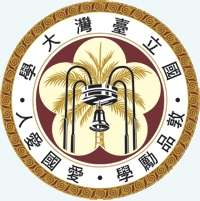National Taiwan University
| 國立臺灣大學 | |
|
Seal of the National Taiwan University | |
Former names | Taihoku Imperial University |
|---|---|
| Motto | 敦品勵學,愛國愛人 Dūnpǐn Lìxué, àiguó àirén |
Motto in English | Integrity, Diligence, Fidelity, Compassion[1] |
| Type | Public (National) |
| Established |
Founded 1928[lower-alpha 1] Reorganized 1945 |
| President | Yang, Pan-Chyr (楊泮池) |
Academic staff |
1,793 (full time), 1,188 (joint and adjunct) |
| Students | 31,758[2] |
| Undergraduates | 16,533 |
| Postgraduates | 15,225 |
| 3,965 | |
| Location |
Taipei, Taiwan 25°00′58″N 121°32′10″E / 25.016°N 121.536°ECoordinates: 25°00′58″N 121°32′10″E / 25.016°N 121.536°E |
| Campus |
Urban, 1.6 km² (Greater Taipei combined), 344 km² (Nantou County combined) |
| Colors | Maroon and gold [3] |
| Affiliations |
ASAIHL AACSB-Accredited EUTW |
| Website |
www |
| National Taiwan University | |||||||||||||||||||||||||||
| Traditional Chinese | 國立臺灣大學 | ||||||||||||||||||||||||||
|---|---|---|---|---|---|---|---|---|---|---|---|---|---|---|---|---|---|---|---|---|---|---|---|---|---|---|---|
| Simplified Chinese | 国立台湾大学 | ||||||||||||||||||||||||||
| |||||||||||||||||||||||||||
| Taihoku Imperial University | |||||||||||||||||||||||||||
| Traditional Chinese | 臺北帝國大學 | ||||||||||||||||||||||||||
| Simplified Chinese | 台北帝国大学 | ||||||||||||||||||||||||||
| |||||||||||||||||||||||||||
National Taiwan University (NTU; Chinese: 國立臺灣大學; pinyin: Guólì Táiwān Dàxué; colloquially, 台大; Táidà; Pe̍h-ōe-jī: Tâi-tāi) is a national co-educational research university located in Taipei, Taiwan. Its 1,086,167 m2 main campus is located in Taipei's Da'an District. In addition, the university has 6 other campuses in Taipei and elsewhere, with a total area of 345,830,000 m2.[4] The University consists of 11 colleges, 54 departments, 103 graduate institutes and 4 research centers.[5] In 2015, the student body consisted of 16,533 undergraduate students and 15,225 graduate students.[2]
The university was founded in 1928 by the Japanese administration during the Japanese colonial era and was then known as the Taihoku Imperial University. After World War II, the government of the Republic of China resumed the administration of the University, reorganizing and renaming it National Taiwan University on November 15, 1945.[6]
NTU is considered the most prestigious university in Taiwan and ranks among the top 150 universities in the world on most surveys. It also has strong ties with the Academia Sinica in Taiwan in the form of research and academic collaborations and a joint program office.[7]
History
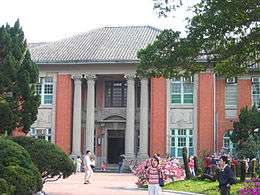
National Taiwan University has its origins in the Taihoku Imperial University (Japanese: 臺北帝國大學 Hepburn: Taihoku Teikoku Daigaku) founded by Taiwan's Japanese colonial government in 1928 as a member of the imperial university system administered by the Empire of Japan.[6]
The school's first president was Taira Shidehara. The Taihoku Imperial University began with a Faculty of Liberal Arts and Law and a Faculty of Science and Agriculture serving 60 students. The university was intended mainly for Japanese nationals; few Taiwanese students were admitted. The Faculty of Medicine and the Faculty of Engineering were added in 1935 and 1943, respectively.[6]
After World War II the government of the Republic of China reorganized the school as an institution for Chinese-speaking students. The school was renamed National Taiwan University on 15 November 1945 and Lo Tsung-lo was appointed as its president. In 1962, joint projects with the Academia Sinica were initiated. An evening division was established in 1967.[6] Between 1972 and 1975, the Philosophy Department Incident took place during the White Terror period authoritarian rule, resulting in the dismissal of several professors.[8]
A new university library opened in 1998.[9] In 1999, the evening division and the Center of Continuing Education merged to form the Division of Continuing Education & Professional Development. Yang Pan-Chyr, the current president, took office in 2013.
Academics
NTU is a member of the Association of Pacific Rim Universities and the Association of East Asian Research Universities.. The university offers bachelor's degrees, master's degrees, and doctorate degrees in many disciplines. Students are able to select courses offered by any of the colleges; however, compulsory subjects designated for each major needs to be completed to be awarded a degree. A student must declare a major during college application, some majors are more competitive than others and require a higher national examination score. In recent years, medicine, electrical engineering, law, and finance have been the most selective majors. Most majors take four years to complete while the dental and the medical degree take six and seven years to finish, respectively.
NTU requires most of its undergraduate students to take a mandatory core curriculum, comprising Chinese, freshman English, physical education, and public service. The medical school in addition dictates each of its students to take philosophy and sociology classes as well as seminars in ethics and thanatology. Military training is no longer an obligatory course for male students, but it is a prerequisite if they plan to apply to become officers during their compulsory military service.
The total number of students, including those enrolled at the School of Professional and Continuing Studies, has grown to over 33,000, including over 17,000 university students and 15,000 graduate students. The university staff and students produced over 5000 research publications in 2010.[10]
Organization
The president heads the university. Each college is headed by a dean, and each department by a chairman. Students elect their own representatives each year to attend administrative meetings.
NTU comprises 11 colleges: bio-resources and agriculture, electrical engineering and computer science, engineering, law, liberal arts, life science, management, medicine, public health, science, and social sciences.[11]
The International Chinese Language Program (ICLP), founded by Stanford University, is located at National Taiwan University.[12]
Campuses
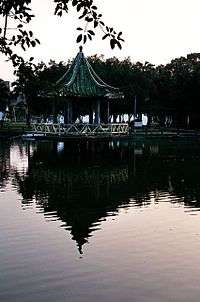
The university has five campuses in the greater Taipei region (including New Taipei City) and two additional campuses in Nantou County, amounting to nearly 1% of the total area of the island Taiwan. The university governs farms, forests, and hospitals for education and research purposes.
The main campus (interactive map) is in Taipei's Da'an District near Gongguan, where most college department buildings and all the administrative buildings are. Notable exceptions is the College of Medicine, which is near the Presidential Building.
The five campuses are:
- Main Campus (No. 1, Sec. 4, Roosevelt Road, Taipei, Taiwan)
- College of Medicine (No. 1, Sec. 1, RenAi Road, Taipei)
- University Hospital (No. 7, ZhongShan South Road, Taipei)
- University Farm (No. 7, Jiu-kuang Road, Xindian, New Taipei)
- Wenshan Botanical Garden (No. 4, Lei-kung Po, Geh-tou Tsun, Shiding, New Taipei)
Research stations
The three research stations are:
- Highland Farm (No. 136, Jen-heh Road, Ta-tung Tsun, Jen-ai, Nan-tou County)
- Experimental Forest
- Department of Forestry (No. 12, Sec.1, Chien-shan Road, Shiang-shan, Nan-tou County)
University presidents
Presidents of Taihoku Imperial University:
- Taira Shidehara (幣原坦): March 1928 - September 1937
- Sadanori Mita (三田定則): September 1937 - April 1941
- Masatsugu Ando (安藤正次): April 1941 - March 1945
- Kazuo Ando (安藤一雄): March 1945 - August 1945
Presidents of National Taiwan University:
- Lo Tsung-lo (羅宗洛): August 1945 - July 1946
- Lu Chih-houng (陸志鴻): August 1946 - May 1948
- Chuang Chang-kung (莊長恭): June 1948 - December 1948
- Fu Szu-nien (傅斯年): January 1949 - December 1950
- Shen Kang-po (沈剛伯): December 1950 - January 1951
- Chien Szu-liang (錢思亮): January 1951 - May 1970
- Yen Cheng-hsing (閻振興): June 1970 - July 1981
- Yu Chao-Chung (虞兆中): August 1981 - July 1984
- Sun Chen (孫震): August 1984 - February 1993
- Kou Guang-hsiung (郭光雄): March 1993 - July 1993
- Chen Wei-Jao (陳維昭): August 1993 - June 2005
- Lee Si-Chen (李嗣涔): August 2005 - June 2013
- Yang Pan-Chyr (楊泮池): June 2013 – present
University rankings
| University rankings | |
|---|---|
| Global | |
| ARWU[13] | 151-200 |
| Times[14] | 167= |
| QS[15] | 68 |
| Asia | |
| ARWU[16] | 15-26 |
| Times[17] | 15 |
| QS[18] | 21 |
NTU is generally considered to be one of the best universities in Taiwan. The QS World University Rankings (2014/15) placed it at 76th worldwide,[19] the highest among universities in Taiwan. Meanwhile, as of October 2015, the university was at 167th in the world (2016) and 17th in Asia (2015) in the Times Higher Education World University Rankings,[20] and 61st-70th in its World Reputation Rankings (2015),[21] both of which regarded it as the first in Taiwan. Moreover, the ARWU (2013) listed it at a position among 101-150th globally and the best in both Taiwan and Greater China.[22] In addition, Nature Publishing Index ranked NTU 2nd in Taiwan in 2013.[23] And in 2014, NTU's College of Management was ranked 79th in the world by Eduniversal.[24]
Alumni
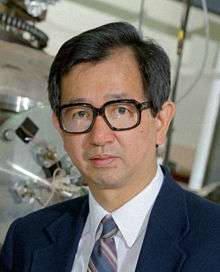
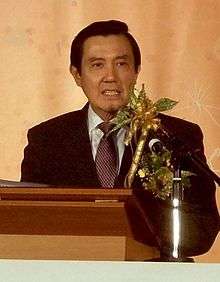
National Taiwan University has produced many notable alumni. Tsai Ing-Wen, the current President of the Republic of China as of 2016, as well as former presidents Lee Teng-hui, Chen Shui-bian and Ma Ying-jeou are all graduates from NTU.[25][26][27] Nobel Prize in Chemistry laureate Yuan T. Lee received his BSc from the university.[28] Over 40 NTU alumni were elected as members of the US National Academy of Engineering or the US National Academy of Science.
Other very well-known alumni include (in alphabetical order by surname):
- Wakin Chau (周華健): famous Hong Kong-Taiwanese Singer-Songwriter
- Sisy Chen (陳文茜): famous talk show host and politician in Taiwan
- Koo Chen-fu (辜振甫) (1940 from then Taihoku Imperial University): late founder and Chairman of the Koos Group of companies
- Li Ao (李敖): writer, social commentator, historian, independent scholar and politician in the Republic of China (Taiwan).[29]
- Lien Chan (連戰): Vice President of R.O.C., 1996–2000
- George Kuo: co-discoverer of Hepatitis C
- Hsien-yung Pai (白先勇): famous writer in Taiwan
- Su Tseng-chang (蘇貞昌): Premier of the R.O.C., 2006–2007
- Wu Den-yih (吳敦義): Current vice president of R.O.C., 2012-
- Tsai Ing-Wen (蔡英文): politician, president of the R.O.C., chair of Taiwan's Democratic Progressive Party
- Wen Shang-Yi ("Monster") (怪獸): guitarist and leader of Taiwanese rock band Mayday.
- Andrew Yao (姚期智): Turing Award 2000; Professor, Princeton University; Professor, Tsinghua University, Beijing (2004 - )
Notes
- ↑ as Taihoku Imperial University
See also
- National Taiwan University Hospital
- European Union Centre in Taiwan
- List of universities in Taiwan
- Education in Taiwan
References
- ↑ "University Motto". National Taiwan University. Retrieved 24 June 2014.
- 1 2 "Table 20: Number of students in each academic year, 1945-2015". National Taiwan University. Retrieved 3 June 2016.
- ↑ "NTU at a Glance". National Taiwan University. Retrieved 15 March 2015.
- ↑ National Taiwan University_Campus Location & Area
- ↑ "About NTU". National Taiwan University. Retrieved 17 January 2012.
- 1 2 3 4 "History of the Presidency - Brief History - About - National Taiwan University"
- ↑ "成立緣起 (Founding of the Joint Program Office)" (in Chinese). National Taiwan University and Academia Sinica Joint Program Office. Retrieved 11 February 2015.
- ↑ 周俊宇 (Chun-yu Chou). "台大哲學系事件 (NTU Philosophy Department Incident)". Council for Cultural Affairs. Retrieved 17 January 2012.
- ↑ "History". NTU Library. Retrieved 17 January 2012.
- ↑ "NTU Statistics". Retrieved 10 May 2012.
- ↑ "Degree Programs". National Taiwan University. Retrieved 25 August 2015.
- ↑ "About ICLP". ICLP of National Taiwan University. Retrieved 25 August 2015.
- ↑ "Academic Ranking of World Universities: Global". Institute of Higher Education, Shanghai Jiao Tong University. 2016. Retrieved September 8, 2016.
- ↑ "World University Rankings 2016-2017". Times Higher Education. 2015. Retrieved October 22, 2016.
- ↑ "QS World University Rankings 2016/17". Quacquarelli Symonds Limited. 2016. Retrieved September 8, 2016.
- ↑ "Academic Ranking of World Universities: Global". Institute of Higher Education, Shanghai Jiao Tong University. 2016. Retrieved September 8, 2016.
- ↑ "Asia University Rankings 2016". Times Higher Education. 2016. Retrieved 11 July 2016.
- ↑ "QS University Rankings: Asia 2016". Quacquarelli Symonds Limited. 2016. Retrieved July 11, 2016.
- ↑ "QS World University Rankings 2014/15". Retrieved 23 January 2015.
- ↑ "Times Higher Education World University Rankings".
- ↑ "Times Higher Education World Reputation Rankings".
- ↑ "ARWU 2013".
- ↑ "Nature Publishing Index (2013)".
- ↑ http://www.eduniversal-ranking.com/business-school-university-ranking-usa/national-taiwan-university-college-of-management.html
- ↑ "Lee Teng-hui". Encyclopædia Britannica Online. Retrieved 17 January 2012.
- ↑ "Chen Shui-bian (1950-)". Office of the President, Republic of China. Retrieved 17 January 2012.
- ↑ "Biography". Office of the President, Republic of China. Retrieved 17 January 2012.
- ↑ "Yuan T. Lee - Biography". Nobelprize.org. Retrieved 17 January 2012.
- ↑ Hwang, Jim (1 March 2000). "Li Ao (New Party): Exposing the Dark Side". Free China Review. Taiwan Today. Retrieved 15 September 2015.
External links
| Wikimedia Commons has media related to National Taiwan University. |
